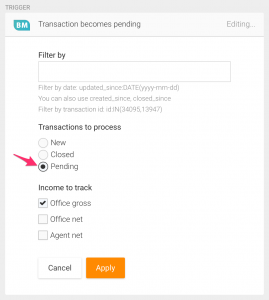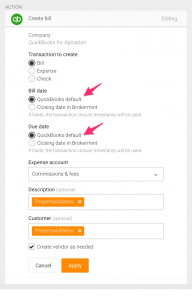The updates include improvements for income and expense tracking in QuickBooks Online and QuickBooks Desktop:
- Watching the pending sales.
- New choices for the transaction and due dates.
Create invoices and sales receipts in QuickBooks for pending sales in Brokermint
Affected workflows:
- Track income via invoice or sales receipt (Brokermint-to-QuickBooks Online, Brokermint-to-QuickBooks Desktop)
We know it doesn’t always make sense to create invoices when there’s no purchase agreement made yet.
So it is true that you have a lot of tasks to perform after a purchase has closed, and sometimes need to have the invoices in place before these are due.
That’s we’ve updated the integration to make it possible to create invoices/sales receipts for pending sales.
The Transactions to process setting allows you to choose what kind of Brokermint transactions the integration should watch and run for:
- New – the integration creates an invoice/sales receipt in QuickBooks when you enter a new transaction in Brokermint
- Closed (default) – the integration creates an invoice/sales receipt in QuickBooks when you close a transaction in Brokermint
- Pending – the integration creates an invoice/sales receipt in QuickBooks when you make transaction pending in Brokermint
Option “Current date” replaced with “QuickBooks default”
Affected workflows:
- Track income via invoice or sales receipt (Brokermint-to-QuickBooks Online, Brokermint-to-QuickBooks Desktop)
- Track disbursements via bills, expenses or checks (Brokermint-to-QuickBooks Online)
- Track disbursements via bills or checks (Brokermint-to-QuickBooks Desktop)
If you choose “QuickBooks default” for both the transaction date and due date, QuickBooks will set transaction date = current date, and due date = [transaction date] + [sales terms].
E.g. if sales terms = 30 days, and invoice date = Aug 19, QuickBooks with automatically set due date = Sep 18.
The “Track income via invoice or sales receipt” workflow will automatically use “QuickBooks default” if you set the invoice due date to “Listing date in Brokermint” and one is blank in the particular Brokermint transaction.
Updates to the “Closing date in Brokermint” option
Affected workflows:
- Track income via invoice or sales receipt (Brokermint-to-QuickBooks Online, Brokermint-to-QuickBooks Desktop)
- Track disbursements via bills, expenses or checks (Brokermint-to-QuickBooks Online)
- Track disbursements via bills or checks (Brokermint-to-QuickBooks Desktop)
Previously, if the integration was set to use “Closing date in Brokermint” as a transaction or due date, and one was blank in the particular Brokermint transaction, the integration substituted it with the current date.
Now, if Closing date is blank, the integration will use the exact (system) date and time you close the transaction in Brokermint.



